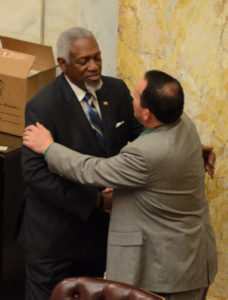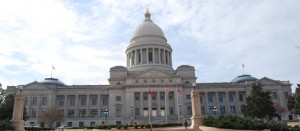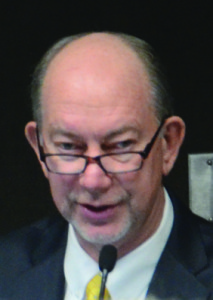
© 2017 by Steve Brawner Communications, Inc.
Over the course of a three-month session, legislators make thousands of speeches at the Capitol. Last Friday, Rep. George McGill, D-Fort Smith, gave one of the most memorable – ever.
The issue was Senate Bill 519 by Sen. David Wallace, R-Leachville, and Rep. Grant Hodges, R-Rogers, which reserves each third Monday in January as a day to honor Dr. Martin Luther King.
This year, Arkansas was one of three states, the others being Alabama and Mississippi, that honored King and Gen. Robert E. Lee on the same day – the result of an unfortunate historical coincidence along with a lack of sensitivity. In 1947, Arkansas made a state holiday out of Lee’s birthday Jan. 19. King’s birthday was made a federal holiday in 1983, which meant there would be two state holidays at about the same time each year. Lawmakers did not want state employees to have another paid vacation day, so in 1985, Gov. Bill Clinton signed a bill combining the holidays.
It’s impossible to know every lawmaker’s intentions in 1985, but regardless, for some people it reasonably has felt like this once-Confederate state was unwilling to give Dr. King his own day. Visitors to the State Capitol on the holiday have been greeted by a sign saying offices were closed to celebrate both King, the civil rights leader, and Lee, the Southern Civil War general. For some, that combination was hurtful.
Two years ago, legislators made an effort to separate the holidays, but it failed under heavy pressure from opponents and fans of Lee and because of the Legislature’s general aversion to upsetting the status quo. For a mostly white Legislature, the combined holiday didn’t seem that big of a deal.
Gov. Asa Hutchinson, newly elected at the time, supported that bill but did nothing to pass it. This year, he announced before the session that a separate King Holiday was one of his priorities, and he testified about the bill before House and Senate committees – the first time he has done so.
The bill says Arkansas will now celebrate only King’s birthday on each third Monday in January while Robert E. Lee Day will be the second Saturday in October – a state memorial day, not a holiday, coinciding with the time of his death. Schools are required to develop teaching materials about the civil rights struggle and the Civil War corresponding to those days.
That arrangement felt to some legislators less like a separation and more like a demotion for Lee. On the House floor Friday, one said it appeared the state was ashamed of its past. Another feared the next step was to remove the star in Arkansas’ flag commemorating its membership in the Confederacy. There was some emotion in the room.
That’s when stately, gray-haired McGill sensed the mood and made his way to the well. “Good afternoon,” he said with a smile, and then repeated the greeting so the House would return it. He then spoke highly by name of his fellow legislators, including one who had vocally opposed the King bill.
Speaking off the cuff, he talked about his great-great-grandfather, also named George McGill, who had fought in the war on the Union side, and he wondered what it had been like for him when the war ended. Did they let him keep his weapon or give him rations? He talked about his own experiences at the University of Arkansas when he was denied a dormitory room because of his race. Looking back at his youth, he recalled his afro hairstyle, his use of the black power salute, and his vow never to return to the University of Arkansas – now, he said, “one of my favorite places to go.”
McGill told House members that Senate Bill 519 would be just one more piece of paper stuck in a big binder in a room full of other big binders. What mattered, he said, was legislators were giving educators space to teach about the past.
No way anyone was following that speech. The vote was 66-11, with 5 voting present and the rest not voting. Hutchinson signed the bill into law Tuesday.
McGill’s biggest accomplishment wasn’t the passage of the bill. It was going to pass anyway. His greatest achievement was bringing healing to what was becoming a racially divisive moment in a chamber that has seen many others through the decades. He reminded everyone listening that it’s possible, even necessary, to both remember and forgive.
He was a peacemaker. Someone once said such are blessed.
Note: Here is the speech. Great job, Brian Fanney.


